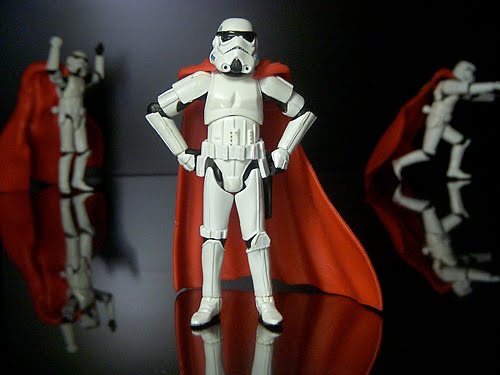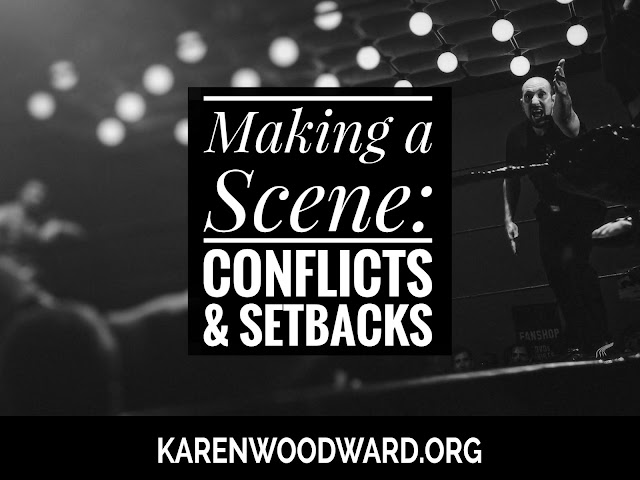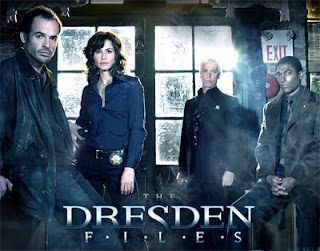Yesterday I promised to write an article about the last tool Mary Robinette Kowal introduced in her (terrific!) workshop at SiWC last weekend,
The Mysteries of Outlining. Namely: "Yes, BUT ... / No, AND ..." Another name for this might be "How to write a scene: conflicts and setbacks".
Characters need setbacks
If your main character got everything she wanted right away then your story would be as entertaining as watching paint dry. The solution: be mean. Give your main character setbacks, lots of them.
Conflicts & Setbacks
Your main character has goals, he wants things. In
Indiana Jones and the Raiders of the Lost Ark, Indiana Jones goes on a quest to find and bring back the lost Ark of the Covenant. About halfway through the movie he finds the ark but is captured and, along with Marion, sealed inside an ancient burial vault and left to die.
What follows is one of the BEST sequences of conflicts and setbacks I've come across. Let's start after Indie finds the ark.
Conflict:
Does Indie find the ark?
Setback: Yes, BUT he is captured, thrown into a pit of snakes, and the antagonist takes the ark.
Remember that it is established early on in the movie that Indiana hates snakes. Spiders and all manner of creepy-crawlies he's fine with, just don't bring him near a snake! (And, yes, I know that there's no logical reason why there would be
THAT many snakes in an ancient burial vault, but the scene still works.)
Conflict: Do Indie and Marion survive the pit of snakes?
Setback: Yes, they use torches to keep the snakes at bay BUT the torches are about to burn out.
Conflict: Do Indie and Marion escape the pit of snakes before their torches burn out?
Setback: Yes, Indie crashes a pillar through a wall providing them a way to escape BUT the room they enter is filled with skeletons that--for Marion at least--seem to come alive.
Conflict: Will Indie and Marion escape from the ancient burial vault they've been entombed in?
Setback: Yes, BUT the bad guys have the ark and Indie needs to get it back.
After every goal Indie achieves there is a setback. I just noticed we didn't come across a "No, AND ..." so lets keep going.
Another FABULOUS sequence in the first Indiana Jones movie--especially from the perspective of what we're talking about here--pulling the reader through a scene, creating conflict and using setbacks to create narrative drive--occurs at around 01:16:33 where Indie decides he's going to commandeer a plane. He fails in the end and it blows up but the sequence of goals/conflicts and setbacks is memorable.
Conflict: Will Indie commandeer the plane?
Setback: No, AND Indie is spotted crawling up the plane, toward the pilot.
Conflict: Indie and a bad guy fight. Will Indie win?
Setback: Yes, BUT a much bigger man starts a fight with Indie (AND the pilot sees indie and knows he's trying to commandeer the plane).
Conflict: The pilot starts to take pot shots at Indie. Will Indie escape being hit?
Setback: Yes, Indie dodges the pilot's bullets BUT the pilot keeps shooting.
Conflict: Indie is fighting a huge bad guy. It looks like he has no chance of winning. Will Indie, against all odds, win the fight against the Man-Mountain?
Setback: No, Indie is not going to win a fist-fight with the Man-Mountain AND the pilot is still shooting at him.
Conflict: The pilot takes aim at Indie, from this angle he can't miss. Will Indie survive?
Setback: Yes, indie survives. Marion hits the pilot over the head and knocks him unconscious BUT as the pilot slumps over in the cockpit he hits some levers and starts the plane rolling forward while Indie fights the Man-Mountain on the ground below.
Conflict: Marion climbs into the cockpit to remove the pilot and stop the plane from moving. Does she succeed?
Setback: No, AND she gets locked inside the cockpit.
You get the idea. The entire scene is well worth watching.
One thing I want to point out before I go on to the next section and talk about scenes is that the stakes for our hero gradually escalate throughout the scene. At first Indie just wants the plane and gets into a fist fight, then there's an impossibly huge guy he has to fight, then someone starts shooting at him, then the plane begins to move, then there's a truckload of German soldiers who see him, then Marion explodes gasoline containers, then there's gasoline on the ground running toward the fire.
At the end of the scene an ocean of gasoline is rushing toward the burning remains of the gas canisters while the Man-Mountain continues to beat Indie to a pulp and, of course, the whole camp has noticed the gasoline barrels explode and is rushing to investigate. It's really quite something.
Scenes & Sequals
To flesh out this discussion let's talk about the larger picture. Conflicts and setbacks are parts of scenes and a novel is made up of scenes and sequels.
Scenes are where the action takes place, where your character has conflicts and setbacks until the end of the scene and he or she attains their goal, or not, as the case may be.
Sequels are where your character reacts emotionally to what's happened, where he or she reviews the facts of their situation and perhaps wonders if their plan is working or whether it needs to be changed. Basically a sequel sets your character(s) up for the next scene and gives your readers a bit of a break from the fast pace.
I'm not going to talk about sequels here, except to point you to
Jim Butcher's post on the subject.
Scenes
Here,
according to Jim Butcher, is the basic format of a scene:
Point of view character: _______________________
Goal: ______________________________________
Conflict (scene question): ______________________
Setback (scene answer): _______________________
POV (Point Of View) Character
Both Mary and Jim say the same thing:
Make your POV character the one who has the most at stake.
Jim Butcher qualifies this by saying it should be the character who has the most at stake
emotionally. If one character may lose his cousin who he never liked and doesn't care about and another may lose his cat who is their best friend then make Cat Guy your POV character.
Keep in mind that, like all writing rules, if you know what you're doing you can break them.
Goal
The goal needs to be ACTIVE and it needs to be SPECIFIC.
Michael Hauge advises writers to think of it in movie terms. How could you
show the character's goal on the screen? It should be something concrete such as (these are Jim Butcher's examples) "Get out of the room alive" not "Do something to save the day".
Conflict: Will your character succeed? WHICH character will succeed? Your hero or the antagonist?
Conflict is whatever will make your character fail in reaching his or her goal.
Between characters. Conflict happens between characters, not between a character and the environment. In the second Indiana Jones scene the plane--specifically its propeller--acted as a threat to Indie, he could have been killed by being forced into its blades, but it was used as a prop, the conflict came from the Man-Mountain trying to force him into the blades.
Conflicting goals. Conflict happens between characters
trying to achieve different goals. Antagonists have goals too, ones that, if fulfilled, would prevent the hero from reaching his or her goal. Jim Butcher writes:
All this really means is that you need an antagonist with the same
specific, attainable goal, the same kinds of emotional stakes, as your
protagonist. Once you've got the right kind of set up, the scene almost
writes itself. (Scenes)
If only!
Setbacks
For every conflict that comes up, a question can be asked: Will our hero succeed? There are four answers:
1) Yes
2) Yes, BUT
3) No
4) No, AND
We've covered this, above. Briefly, "Yes" won't get us anywhere. The hero needs setbacks because if his goal were just handed to him that would be very dull. The hero doesn't get everything he wants until the end of the book--and sometimes not even then!
"No" can work but it can be frustrating and cast your hero in a bad light. Use sparingly.
The other two, "Yes, BUT" and "No, AND" we've covered, above.
So, what are you waiting for! Go write a killer scene. :-)
Update (April 28, 2014): I go into this topic in more detail in
Parts of Story: Try-Fail Cycles.
Other articles in this series:
-
Orson Scott Card & The MICE Quotient: How To Structure Your Story
-
Mary Robinette Kowal and The Mysteries of Outlining
-
The Mysteries of Outlining and Nesting MICE: Creating Killer Stories
Other articles you might like:
-
Jim Butcher On Writing
-
NaNoWriMo: How To Reach Your Daily Wordcount
-
Book Review Blogs That Accept Self-Published Work












